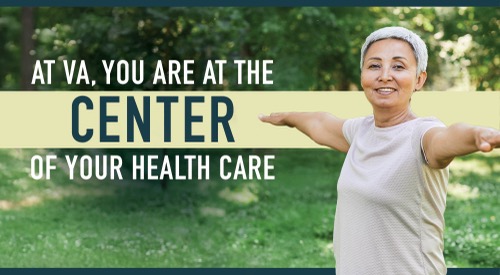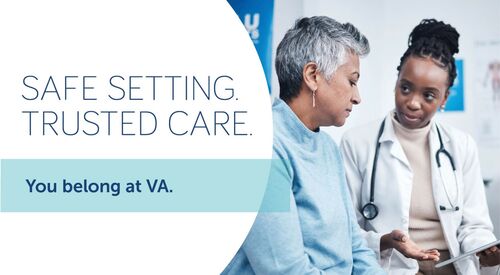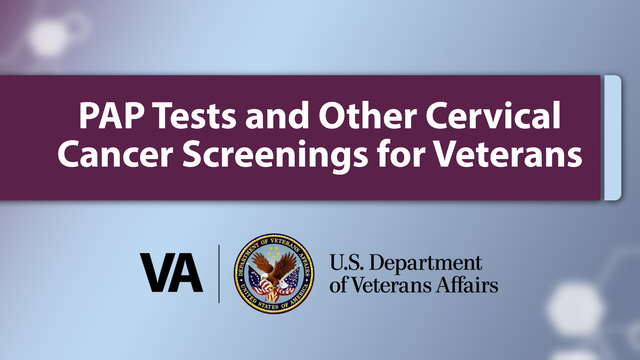What's New
Latest items
Articles and blogs
Build your family with support from VA
VANews, December 9, 2024Every Veteran's journey to building a family is unique, and whether you're just beginning to think about options or you're exploring fertility treatments, it's important to know that VA can support you along the way. You have access to a wide range of services that can help make parenthood a reality, and more Veterans can now receive the care needed to build a family.
VA raises the bar on care for Women Veterans
VANews, December 6, 2024The Barriers for Women Veterans to VA Health Care 2024 report highlights increased satisfaction among women Veterans, with 83% feeling safe at VA facilities and 82% pleased with their providers. Improvements since 2014 include cleaner facilities, better parking, and enhanced provider training, leading to 86% satisfaction with medical knowledge. Challenges exist, but VA is addressing these through expanded hours, telehealth, childcare support, and tailored care, reaffirming its commitment to accessible, comprehensive, and respectful health care for women Veterans.
Women Veterans, armor up!
VANews, November 7, 2024Women Veterans, now is a great time to review your vaccine history and discuss with your VA health care provider which vaccines are right for you. Vaccines are a vital part of preventive care, especially as your health needs change with age, wellness, and reproductive stages like pregnancy. Vaccination protects your health and helps prevent the spread of diseases to others, including those unable to be vaccinated. Recommended vaccines include flu, COVID-19, Tdap, HPV, shingles, pneumonia, hepatitis, and RSV. Each vaccine targets specific risks based on your age, health, or pregnancy status. For instance, flu and Tdap vaccines are crucial during pregnancy to protect both you and your baby. Vaccines are safe and effective, with mild side effects like soreness or fatigue that typically resolve in a few days. If you're pregnant or planning to become pregnant, consult your VA provider about which vaccines to receive or avoid during this time. Getting vaccinated at VA ensures your medical records stay updated and your preventive care is seamless. For guidance, call the Women Veterans Call Center at 1-855-VA-WOMEN or visit VA's Preventative Care page. Take charge of your health today—vaccinate with VA!
Women Veterans: Lower your risk for diabetes
VANews, November 4, 2024Life after service can bring lifestyle changes like less physical activity, new eating habits, smoking, or increased stress. Unfortunately, these factors can raise your risk of developing diabetes. Women Veterans are 2.5 times more likely than non-Veterans to develop Type 2 diabetes, but prevention is possible. Diabetes happens when your blood sugar levels are too high. Type 2 diabetes, the most common type, often develops in adults and is linked to being overweight or inactive. It can often be prevented with healthy lifestyle changes. Type 1 diabetes is less common, occurs when your body doesn't produce insulin, and requires daily insulin treatment. Gestational diabetes can occur during pregnancy, increasing future risks for both mother and baby. Risk factors for diabetes include being overweight, inactive, having a family history, or certain conditions like polycystic ovary syndrome (PCOS). Symptoms may include fatigue, frequent urination, increased hunger or thirst, or blurred vision. However, diabetes often develops without symptoms, so routine VA checkups are essential. VA offers personalized care, from prevention programs to diabetes management, including resources for nutrition, exercise, and medications. Speak with your VA provider or call the Women Veterans Call Center at 1-855-VA-WOMEN to learn more and take control of your health.
Up to 70% of women with PCOS remain undiagnosed
VANews, September 1, 2024Women Veterans experiencing symptoms like irregular periods, unwanted hair growth, acne, or difficulty losing weight may be showing signs of polycystic ovary syndrome (PCOS), a common hormonal disorder affecting 1 in 10 women. PCOS can lead to symptoms such as missed periods, excessive facial hair, acne, obesity, and infertility. It also increases the risk of conditions like diabetes, heart disease, depression, and uterine cancer. Although PCOS can cause fertility issues, it is treatable, and with guidance from VA health care providers, women can manage symptoms, improve fertility, and reduce pregnancy complications. Early diagnosis is key, and PCOS is diagnosed through a combination of physical exams, blood tests, and ultrasounds. Treatment may include lifestyle changes, medication, and support services like weight management, mental health care, and infertility treatment. Women Veterans are encouraged to seek support from their VA primary care provider for managing PCOS and associated health risks. VA offers a range of resources including gynecologic evaluations, infertility treatment, and maternity care.
VA offers compassionate care for pregnancy loss
VANews, August 1, 2024Every form of pregnancy loss comes with its own circumstances and may affect each person differently. However, you're not alone. Pregnancy loss is a common experience that many women share. VA is here to offer compassionate care and support for pregnancy loss. From connecting you to mental health resources for emotional support to offering personalized health care to help you physically recover, we're committed to being there for you every step of the way, no matter what your journey looks like.
Prosthetic options for women Veterans
VANews, July 1, 2024Women Veterans deserve the best prosthetic and sensory aids designed to fit their lifestyle and body based on their unique health care needs. VA offers comprehensive and advanced prosthetic devices, sensory aids and rehabilitation services. We know that size and appearance matter. We're further enhancing options so you can choose items that meet your personal style and body type.
National Women's Health Week
VANews, May 13, 2024Women often are the linchpins of their families and communities. Women are caregivers, professionals, partners, parents, household managers and more. Often, they put others' needs before their own, sometimes neglecting their own health and wellbeing. Women Veterans may have additional unique health needs that may require special attention. That's where National Women's Health Week comes in. Falling on May 12-18 this year, this week is a reminder to women and women Veterans to make their health-both physical and mental-a priority.
Women Veterans: Suicide is preventable and support is available
VANews, May 6, 2024Suicide has no single cause and no one approach can end it, but prevention is possible, especially when women Veterans find support before a crisis happens. Women Veterans may have unique experiences related to military service. Your health and wellbeing and exposure to trauma can increase the risk of suicide. Some Veterans also face medical and social issues that affect relationships and quality of life. VA is committed to offering a growing range of resources and a network of support for all women Veterans, including those who do not and may never seek care with VA.
It May Be Your Thyroid
VANews, May 3, 2024Women Veterans: Have you experienced a significant shift in your weight, mood, energy, temperature tolerance, periods or skin and hair? It may be your thyroid. About 60% of people with a thyroid condition are unaware but it's a common issue among women.
Black maternal health matters at VA
VANews, April 11, 2024Black women make up more than 30 percent of all women Veterans receiving health care at VA. This Black Maternal Health Week, we aim to raise awareness about the unique challenges and disparities faced by Black mothers in the realm of maternal health care and promote equitable and accessible health care.
Are you struggling with unhealthy eating patterns?
VANews, April 2, 2024Eating disorders affect many Veterans, but as a woman Veteran you may be at an increased risk. From unpredictable eating schedules and meals eaten quickly to trauma and the pressure to “make weight,” your previous military experience might affect your relationship with food today.
Women Veterans: Trouble sleeping?
VANews, March 6, 2024Women Veterans: Are you having trouble sleeping? You're not alone. Half of women Veterans experience sleep issues, but treatment is available. As women, we unfortunately experience sleep issues more often and differently than men due to hormonal changes unique to us, like premenstrual syndrome (PMS), premenstrual dysphoric disorder (PMDD), pregnancy or menopause. As a Veteran, you may experience mental health conditions that can also have a significant impact on your sleep.
Women's History Month: Honoring Native American Women Veterans
VANews, March 1, 2024During Women's History Month 2024, VA Office of Women's Health is honoring Native American women Veterans. VA recognizes the impact your advocacy, contributions, and sacrifice have made on our military history. Native American women Veterans have had an exemplary tradition of military service for over 200 years, overcoming adversity and serving at a higher rate compared to any other demographic, demonstrating your dedication to our country and everlasting commitment to service. Today, women make up ~11.3% of the Native American Veteran population (about 20,000), which is a higher percentage than women in all other demographics.
Women Veterans, VA may surprise you
VANews, January 15, 2024Women Veterans, you may be surprised to learn about all VA has to offer. If you haven't checked out VA in a while, things have changed. We recognize each of you are unique and your health care needs are not "one-size-fits-all". That's why VA continues to expand its services, so we can provide you with the best care possible to better fit your needs.
Safe settings and trusted care for women Veterans
VANews, January 3, 2024You belong at VA, where you have options for how you receive your care. VA understands that traumatic experiences may affect the lives and health of many women Veterans before, during and after military service. You have access to trauma-informed care at VA. Our health care staff are specifically trained to help you feel comfortable and safe at every appointment, in each exam room and across all VA medical facilities.
Go to the Article and Blog Archive
Women Veterans Health Care Videos
Watch videos for and about Women Veterans.Women Veterans Health Care Outreach Posters
View our Outreach Posters.The Women Veterans Call Center is your guide to women's health
If you have questions or can't find what you're looking for, you can call, text, or chat online with the Women Veterans Call Center (WVCC) at 855-829-6636 to get help and find available resources and services in your area. Trained women representatives can also:
- Provide you with information on enrolling in VA health care if you have not already
- Provide you with information on setting up a medical appointment in your area
- Provide you with information about your eligibility (including questions about disability ratings) and other VA benefits like employment, education, and home loans
- Connect you with your local VA Medical Center or local women's health contact who can assist in coordinating all the services you need
WVCC representatives are available Monday through Friday, 8:00 a.m. to 10:00 p.m. ET, and Saturday, 8:00 a.m. to 6:30 p.m. ET.



























